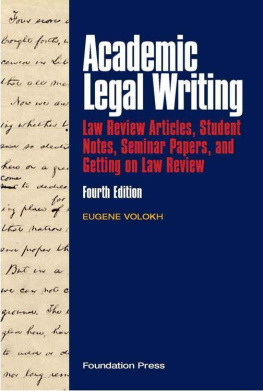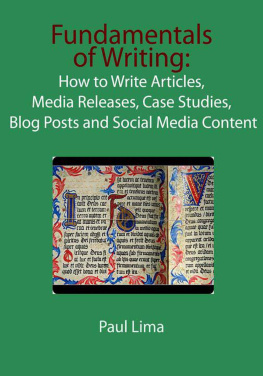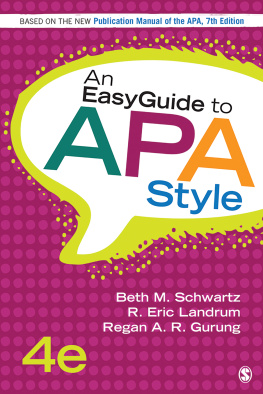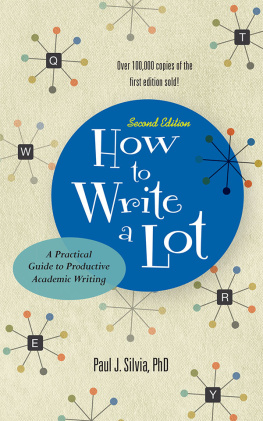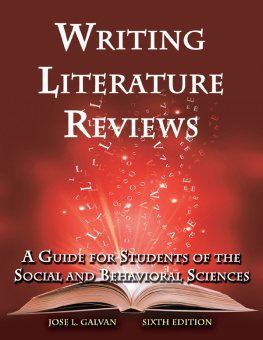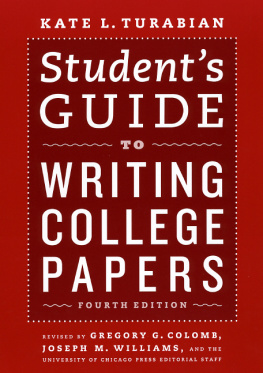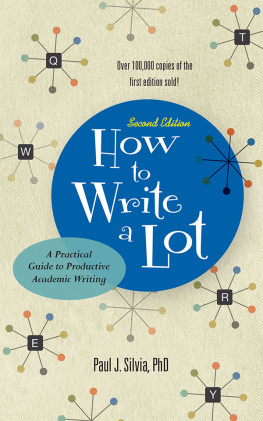TABLE OF CONTENTS
ACADEMIC LEGAL
WRITING:
LAW REVIEW ARTICLES,
STUDENT NOTES,
SEMINAR PAPERS, AND
GETTING ON LAW REVIEW
by
EUGENE VOLOKH
Gary T. Schwartz Professor of Law
UCLA School of Law
with foreword by
CHIEF JUDGE ALEX KOZINSKI
U.S. Court of Appeals for the Ninth Circuit
FOUNDATION PRESS
NEW YORK, NEW YORK
Fourth Edition 2010
This publication was created to provide you with accurate and authoritative information concerning the subject matter covered; however, this publication was not necessarily prepared by persons licensed to practice law in a particular jurisdiction. The publisher is not engaged in rendering legal or other professional advice and this publication is not a substitute for the advice of an attorney. If you require legal or other expert advice, you should seek the services of a competent attorney or other professional.
Nothing contained herein is intended or written to be used for the purposes of 1) avoiding penalties imposed under the federal Internal Revenue Code, or 2) promoting, marketing or recommending to another party any transaction or matter addressed herein.
2003 FOUNDATION PRESS
2005, 2007 THOMSON REUTERS/FOUNDATION PRESS
2010 By THOMSON REUTERS/FOUNDATION PRESS
195 Broadway, 9th Floor
New York, NY 10007
Phone Toll Free 18778881330
Fax (212) 3676799
foundationpress.com
Printed in the United States of America
ISBN 9781599417509
Mat #40881285
To my beloved wife and sons,
Leslie Pereira,
Benjamin Pereira Volokh, and
Samuel Pereira Volokh
*
ABOUT THE AUTHOR
Eugene Volokh is the Gary T. Schwartz Professor of Law at UCLA, where he teaches free speech law, Religion Clauses law, criminal law, tort law, and academic legal writing. Before going into teaching, he clerked for Ninth Circuit Judge Alex Kozinski and for Justice Sandra Day O'Connor.
Since starting teaching in 1994, he has written (or, in a few instances, co-written) over 65 law review articles, including two in the Harvard Law Review , two in the Yale Law Journal , and five in the Stanford Law Review . He has also written over 80 op-eds in publications such as the Wall Street Journal , New York Times , Washington Post , New Republic , and many others. He is the author of The First Amendment and Related Statutes , a textbook from Foundation Press, and the operator of a daily blog called The Volokh Conspiracy ( http://volokh.com , founded 2002). He is a member of the American Heritage Dictionary Usage Panel and the American Law Institute.
The article he wrote while in law school, Freedom of Speech and Workplace Harassment (UCLA L. Rev. 1992), has been cited in over 190 academic works and in 14 court cases; this seems to make it the mostcited student article from the 1990s and 2000s. A 2002 survey by Prof. Brian Leiter listed Volokh as the third most cited professor among those who entered law teaching after 1992 (with 810 citations in law reviews at the time; today, the number is about 2100). Four of his law review articles have also been cited in the opinions of Supreme Court Justices.
In Spring 2006, he participated anonymously (and, he's glad to report, successfully) in the UCLA Law Review write-on competition, to better hone the advice that he gives in the Getting on Law Review chapter. His pain is your gain.
ACADEMIC LEGAL
WRITING:
LAW REVIEW ARTICLES,
STUDENT NOTES,
SEMINAR PAPERS, AND
GETTING ON LAW REVIEW
FOREWORD, BY JUDGE ALEX KOZINSKI
A few years ago I interviewed a candidate for a clerkship. He had record-breaking grades from a name-brand law school and his recommenders sprinkled their letters with phrases like Kozinski clone and better even than you. This kid was hot.
His interview went well, and I had pretty much made up my mind to hire him on the spot, when I popped a fateful question: So, have you decided on the topic for your law review note?
It's done, the candidate replied. And, with a flourish, he pulled an inch-thick document from his briefcase and plopped it on my desk. Impressed, I picked it up and read the title page: The Alienability and Devisability of Possibilities of Reverter and Rights of Entry.
After making sure this wasn't a joke, I started wondering why someone would write a piece on such an arcane topic. Maybe this kid wasn't so smart after all. I decided I had better read the piece before making a hiring decision.
After the applicant left, his article sat on the corner of my desk like a brick. Every so often, I'd pick it up, leaf through it and try to read it, but with no success. It was well-written enough; the sentences were easy to understand and followed one another in seemingly logical fashion. But the effort was pointless because the subject matter was of absolutely no interest to me. Instead, my mind wandered to doubts about the author. How did he come to write on such a desiccated topic? Under that veneer of brilliance, was there a kook trying to get out? Could I really trust his judgment as to the countless sensitive issues he would have to confront during his clerkship? Would he constantly aim for the capillary and miss the jugular?
It is difficult to overstate the importance of a written paper for a young lawyer's career, especially if the piece is published. Grades, of necessity, are somewhat grainy and subjective; is an A- that much better than a B+? Letters of recommendation can be more useful, but they still rely on someone else's judgment, and they often have a stale booster quality about them. Words like fabulous and extraordinary lose their force by dint of repetitionthough Kozinski clone is still pretty rare.
A paper is very different. It is the applicant's raw work product, unfiltered through a third-party evaluator. By reading it, you can personally evaluate the student's writing, research, logic and judgment. Are the sentences sleek and lithe or ponderous and convoluted? Does he lay out his argument in a logical fashion, and does he anticipate and refute objections? Is the topic broad enough to be useful, yet narrow enough to be adequately covered? Is it persuasive? Is it fun to read? Writing a paper engages so much of the lawyer's art that no other predictor of likely success on the job comes close. A well-written, well-researched, thoughtful paper can clinch that law firm job or clerkship. It is indispensable if you aim to teach.
Published student papers can also be quite useful and influential in the development of the law. A few law review notes and comments become classics cited widely by lawyers, courts and academics. Many more provide a useful service, such as a solid body of research or an important insight into a developing area. Most, however, are read by no one beyond the student's immediate family and cause hardly an eddy among the currents of the law.
Why do so many published student papers fail in their essential purpose? (The same question might well be asked about non-student academic writing.) The simple answer is that most students have no clue what to write about, or how to go about writing it. Finding a useful and interesting topic; determining the scope of the paper; developing a thesis and testing its viability; avoiding sudden death through preemption; and getting it placed in the best possible journalthese are among the tasks that most students aren't trained to perform. My applicant, smart though he was, went off track because no one showed him where the track was or how to stay on it. Many students make the same mistake every year.
This book fills a void in the legal literature: It teaches students how to go about finding a topic and developing it into a useful, interesting, publishable piece. It gives detailed and very helpful instructions for every aspect of the writing, research and publication process. And it comes from the keyboard of someone who has authored articles on a dizzying variety of legal topics and is widely regarded as one of the brightest lights in legal academia.
Next page
